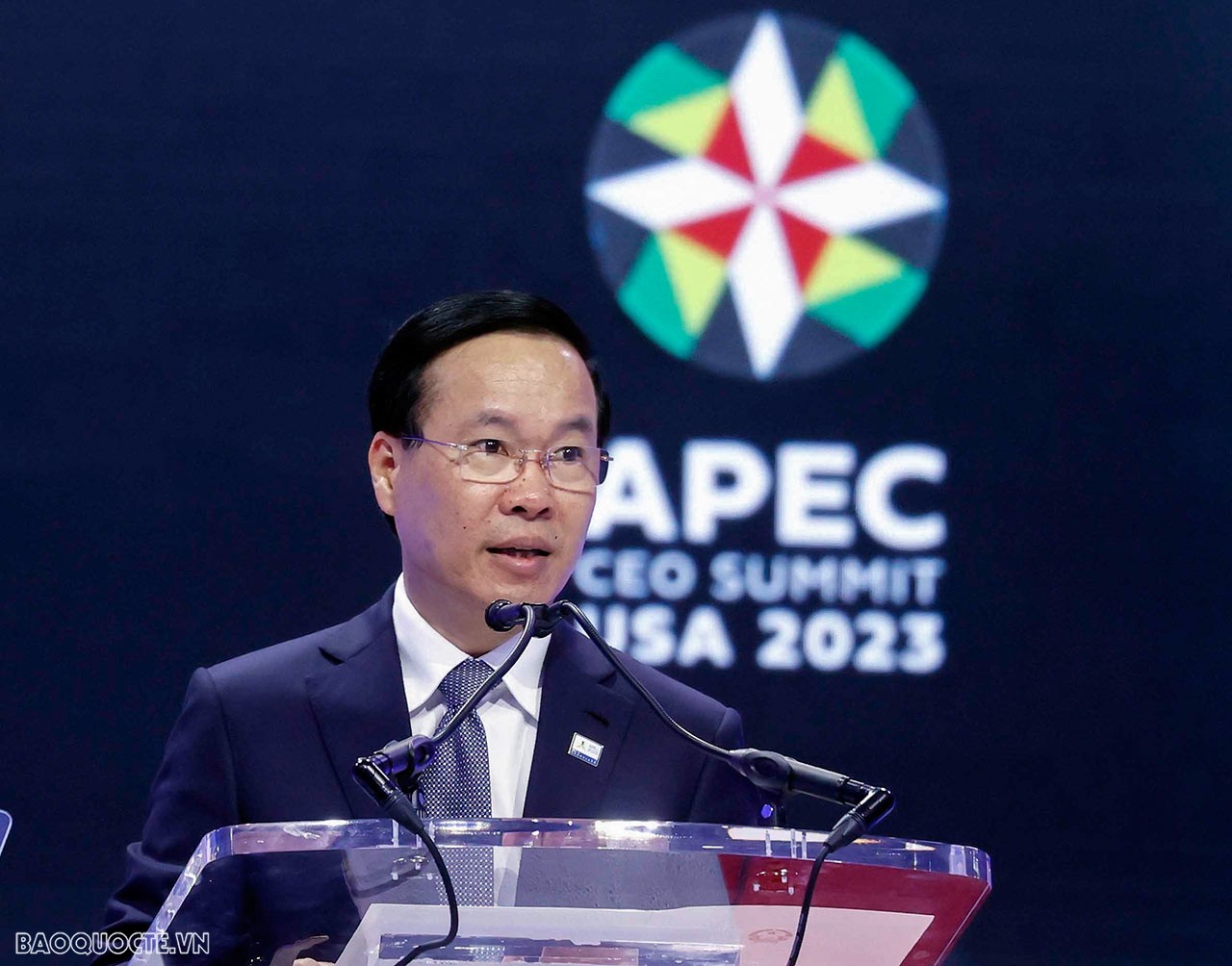 |
| President Vo Van Thuong delivers a speech at the APEC CEO Summit 2023 with the theme 'Sustainable and Inclusive Development'. |
The President said that the APEC Business Summit 2023 is an important occasion for members to share visions and seek effective solutions to major, urgent, and strategic issues for the future of the region and the world.
At the same time, we believe that this Conference will make practical contributions to cooperation and development in Asia-Pacific, as well as the success of the regional business community.
The President discussed three main contents at the Conference.
On the issues facing the world economy and the need for new thinking and new approaches
The President said that the history of human development is a process of continuous discovery, innovation, adaptation, and tireless striving for peace, progress, and prosperity. However, the world economy today is facing major contradictions.
First, the economy grows, wealth increases, but the gap between rich and poor increases and environmental destruction becomes more and more serious.
Second, after more than three decades of the world benefiting from globalization and forming a network of international economic relations with intertwined interests and mutual dependence, the trend of protectionism and separation has increased strongly.
Third, science and technology are developing rapidly, with global influence, but the institutional framework is still basically limited to the national level; science and technology bring great development opportunities but also pose unpredictable dangers.
Fourth, we pursue a growth model that encourages consumption, even over-consumption, but cannot mobilize enough resources for the Sustainable Development Goals.
To fundamentally resolve these contradictions, the President said that, first of all , it is necessary to ensure the mutual relationship between economic growth, social equity and environmental protection. The measure of an economy's success is not only the scale and growth rate of GDP but also the welfare enjoyed by its people and the impact on the environment in both the short and long term.
Economic growth based on consumption and resource exploitation needs to be replaced by a more sustainable, circular economic model.
At the national level, economic development policies not only aim to facilitate business investment, but also improve the quality of employment, increase income for workers, and contribute to preserving the ecological environment.
At the regional and global levels, cooperation between countries not only affects climate change reduction and clean energy transition, but also creates conditions for developing countries to expand their economies and narrow the development gap. And finally, at each enterprise, the new business philosophy is to link corporate profits with the common interests of society.
Second , maintaining an open and connected world economy goes hand in hand with ensuring the economic security of countries. The Covid-19 pandemic and recent uncertainties have highlighted the fragility of the economy and supply chains in the face of shocks.
Ensuring economic stability and security is a legitimate need of every country. However, increasing protectionism and market fragmentation will weaken the global economy and reverse the achievements of international economic integration.
Close coordination between countries is needed to enhance the ability to respond to crises. Building a transparent and equitable global economic governance system that ensures the balance of interests of all countries, large and small.
Third , global governance of technology (especially artificial intelligence and biotechnology) is not only aimed at managing the development of technologies, but also must address the economic, social, cultural and political consequences of this process.
The formulation of common laws, regulations and standards must take into account the development level of each country, ensuring that all countries, large or small, and all people benefit from scientific and technological progress.
At the same time, it is necessary to ensure a balance between creating a favorable environment for science and technology development and ensuring national safety, security and sovereignty.
Fourth , we need to prioritize resources for sustainable and inclusive development goals. The world is more than halfway through the 2030 Sustainable Development Goals, but the gap between commitment and reality is still too wide.
With the current approach, the Asia-Pacific region can only complete these goals by 2065, which is 35 years later than the original plan.
Therefore, there is an urgent need to mobilize and effectively use public, private, domestic and international financial resources, as well as contributions from organizations and people. Developed countries also need to better fulfill their commitment to contribute 0.7% of their gross national income to support developing countries.
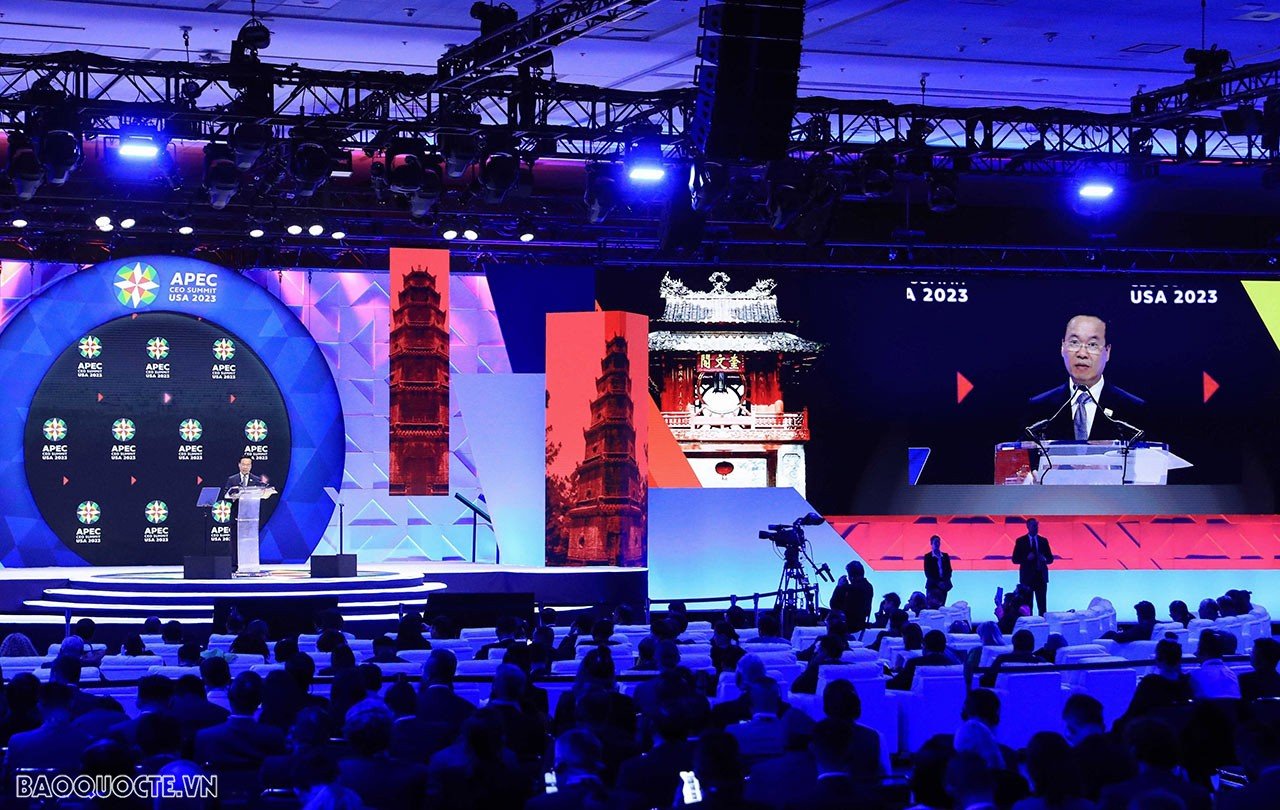 |
On APEC's contribution to addressing world economic challenges
President Vo Van Thuong said that APEC has always been an "incubator" of economic cooperation ideas, laying the foundation for global cooperation agreements.
APEC is also at the forefront of promoting green growth, responding to natural disasters, strongly supporting the military, supporting small and medium enterprises, improving the quality of health and education. These successes have always been accompanied and contributed significantly by the business community in the region.
“Today, when the global economy is facing a new wave of protectionism, challenges from climate change, social inequality and geopolitical conflicts, APEC is the place for us to seek and test new ideas and solutions,” said the President.
The President believes that APEC will continue to play an important role on the new journey, especially in terms of content.
First , restore and strengthen confidence in free trade and investment. The history of international trade has had its ups and downs, but trade has contributed greatly to the development and prosperity of nations.
Yet, since 2019, more than 3,000 trade barriers have been erected, crippling the global economy and threatening to reduce global economic output.
More than ever, APFC needs to reaffirm its commitment to maintaining open markets, promoting international economic integration, and supporting an open, inclusive and sustainable world economy. Ensuring that the benefits of trade are widely and equitably distributed in society.
Free trade and investment will help Asia-Pacific economies improve their competitiveness and continue to be the top choice for investors.
Second , promote international cooperation on economic security, especially enhancing the resilience of member economies and businesses in the region to future crises.
APEC is a forum for economies to enhance information sharing, coordinate policies, promptly resolve difficulties and ensure the smooth operation of regional supply chains. In addition, cooperation on food security, energy security and trade connectivity to diversify supply sources will also contribute to strengthening the economic security of members.
Third , support economies to prepare to embrace new development trends through (l) Applying and managing breakthrough technologies, especially artificial intelligence, quantum computing, and biotechnology; testing the development of principles and orientations on technology management at the regional level;
(ii) Research, pilot and replicate green economic models, circular economy, and clean energy conversion;
(iii) Enhance capacity for social policy making so that all people, especially women, the poor, the vulnerable, and small and medium enterprises, can actively participate in and benefit from economic growth.
The business community has always been an important part of the APEC process, actively contributing to policy formulation and implementation as well as promoting new ideas and new thinking.
Faced with the enormous challenges we are facing, the President called on the business community to join the State in fulfilling its commitment to sustainable development, pursuing long-term economic, environmental and social goals; increasing investment in science and technology, investing in people, investing in building inclusive and resilient communities. This is an opportunity for businesses to make their mark in society, building trust and brand value.
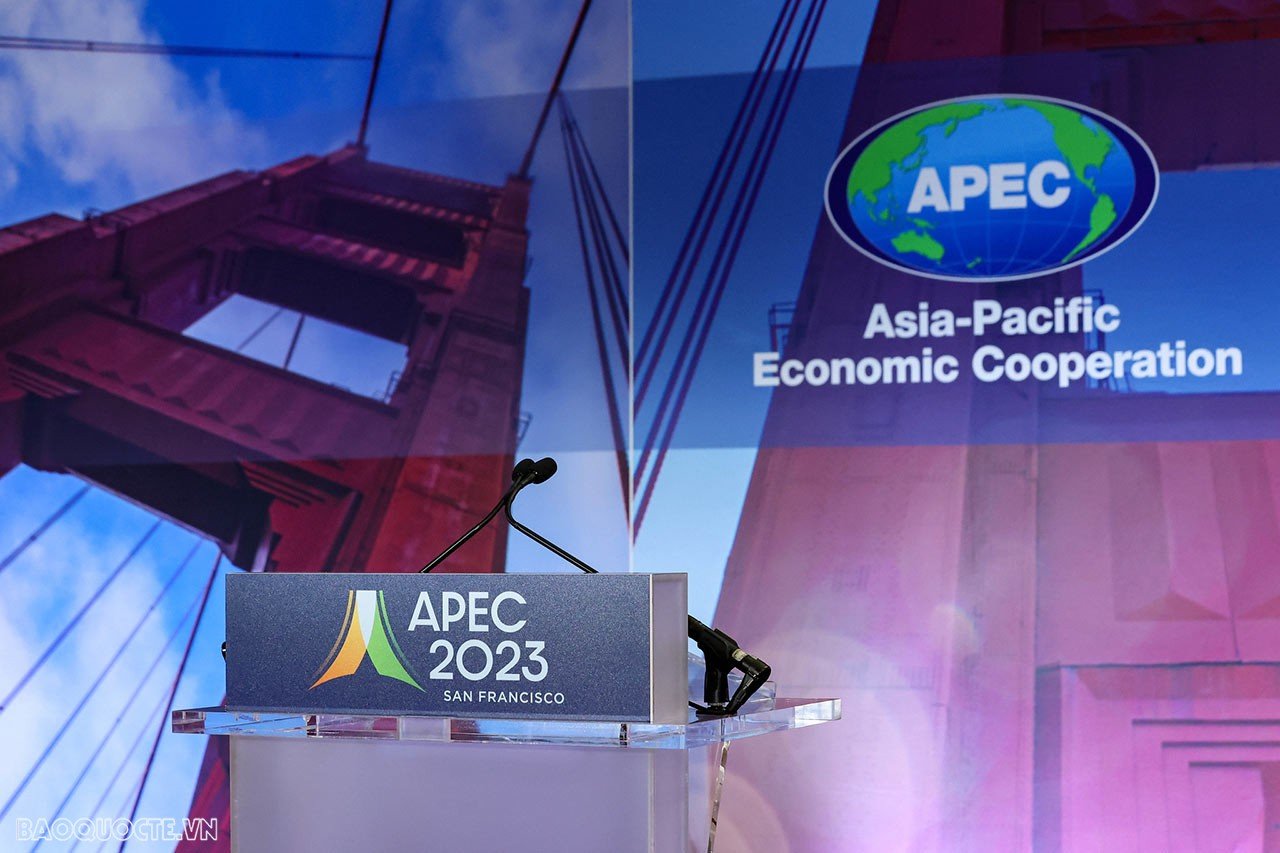 |
On Vietnam's development views and policies
The President affirmed that maintaining sustainable economic growth coupled with progress, social justice and protection of the ecological environment, ensuring that all people can develop their potential, participate and equally enjoy the achievements of development is a consistent requirement throughout Vietnam's development process.
Economic growth must go hand in hand with social progress and equity, which must be carried out in every step, every policy, and throughout the development process; not "sacrifice" social progress and equity, and the environment to pursue mere economic growth.
With that viewpoint, the President said that Vietnam is synchronously implementing three main groups of solutions.
One is to build an independent and self-reliant economy associated with active and proactive international integration, taking internal strength as the foundation, strategy and decision, and external strength as important and breakthrough.
Accordingly, the focus is on promoting economic restructuring associated with innovation of the growth model towards green and clean growth, aiming to realize the goal of carbon neutrality by 2050. At the same time, promoting the implementation of 3 strategic breakthroughs in institutions, infrastructure and human resources; promoting development based on science - technology, innovation and culture, and Vietnamese people.
With these efforts, Vietnam is considered one of the seven middle-income countries that have made great progress in innovation over the past decade, and one of the three countries that have outperformed their development level for 13 consecutive years.
The President said that, along with maintaining macroeconomic stability and ensuring major economic balances, Vietnam attaches great importance to promoting international trade and investment cooperation.
Vietnam has signed more than 90 trade agreements and 60 bilateral investment promotion and protection agreements; is a member of 16 Free Trade Agreements with the participation of about 60 economies. Vietnam has continuously been in the group of 30 countries and territories with the largest import and export value of goods and the top 10 FDI attractions in recent years.
Second , strengthen the management and efficient use of resources, protect the environment and respond to climate change, promote green transformation to achieve global goals and commitments on climate. In parallel with perfecting mechanisms, policies and laws to promote the development of green economy, low-carbon economy and circular economy, the State also studies to supplement many tools to support businesses in digital transformation, green transformation, especially the application of new technologies, access to green financial resources and human resource training.
The establishment of the Just Energy Transition Partnership (JETP) between Vietnam and a group of international partners will also make an important contribution to realizing Vietnam's commitment at COP 26 to achieve net zero emissions by 2050.
Third , create an environment that encourages the poor and the weak to rise up on their own, integrate into the community, and eliminate discrimination in society. People are the target and subject of development, and all future policies and activities must aim for the happiness of the people.
Vietnam is implementing three national target programs on sustainable poverty reduction; new rural construction and socio-economic development in ethnic minority areas, focusing on improving the quality of human resources through developing an equal, inclusive and comprehensive education and training system and vocational education; while creating conditions for young workers to access science and technology.
To achieve the set development goals, in addition to its own efforts, the President emphasized that Vietnam hopes that you will continue to accompany Vietnam in consulting, proposing new investment policies and ideas; transferring modern solutions, technologies, new economic models; and attracting investment capital and supporting development.
With the policy of taking quality, efficiency, high technology and environmental protection as the top criteria, Vietnam prioritizes attracting investment projects in industries and fields such as: Science - technology, innovation; Green economy, digital economy, circular economy, knowledge economy; Electronic components, electric cars... Semiconductor production, new energy (such as hydrogen), renewable energy; Development of financial centers, green finance; and (vi) Biotechnology, healthcare,...
Vietnam always cares about and accompanies the business community both domestically and internationally; respects and protects the legitimate and legal rights and interests of investors; as well as ensures the harmony of interests between the State, investors and workers.
“We consider the success of businesses as our own success, and the failure of businesses as the failure of the State in policy management,” the President affirmed.
**
*
Finally, the President emphasized that APEC's success can only be achieved on the basis of friendship and trust among members and the support of businesses and people.
The President hopes that all APEC members will uphold the spirit of cooperation and responsibility, uphold multilateralism, put aside differences to jointly resolve difficulties and overcome challenges for peace, cooperation and development in the region and the world.
Vietnam is ready to join hands with APEC members and the Asia-Pacific business community to build a bright future for all people. I believe that with our solidarity and determination, APEC will continue to write success stories in the new development period.
Source


![[Photo] General Secretary concludes visit to Azerbaijan, departs for visit to Russian Federation](https://vphoto.vietnam.vn/thumb/1200x675/vietnam/resource/IMAGE/2025/5/8/7a135ad280314b66917ad278ce0e26fa)
![[Photo] Prime Minister Pham Minh Chinh meets with the Policy Advisory Council on Private Economic Development](https://vphoto.vietnam.vn/thumb/1200x675/vietnam/resource/IMAGE/2025/5/8/387da60b85cc489ab2aed8442fc3b14a)
![[Photo] General Secretary To Lam begins official visit to Russia and attends the 80th Anniversary of Victory over Fascism](https://vphoto.vietnam.vn/thumb/1200x675/vietnam/resource/IMAGE/2025/5/8/5d2566d7f67d4a1e9b88bc677831ec9d)
![[Photo] President Luong Cuong presents the decision to appoint Deputy Head of the Office of the President](https://vphoto.vietnam.vn/thumb/1200x675/vietnam/resource/IMAGE/2025/5/8/501f8ee192f3476ab9f7579c57b423ad)
![[Photo] National Assembly Chairman Tran Thanh Man chairs the meeting of the Subcommittee on Documents of the First National Assembly Party Congress](https://vphoto.vietnam.vn/thumb/1200x675/vietnam/resource/IMAGE/2025/5/8/72b19a73d94a4affab411fd8c87f4f8d)



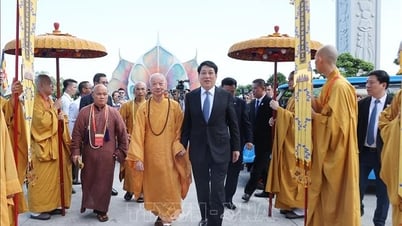

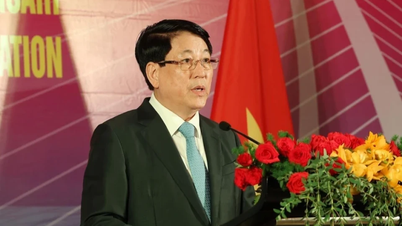

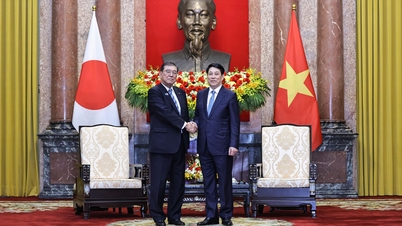

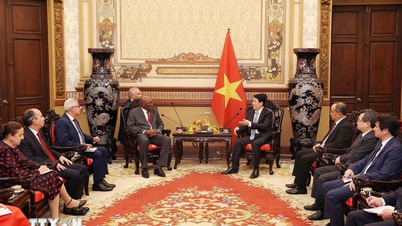
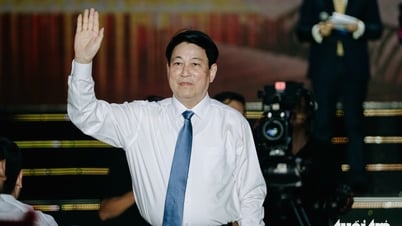

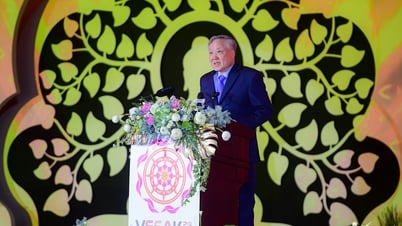
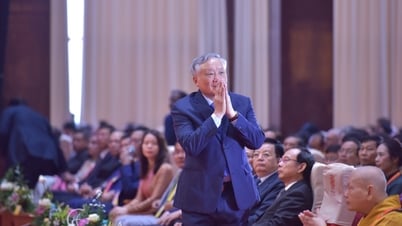

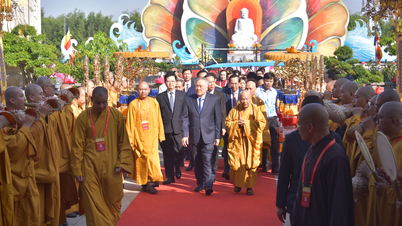
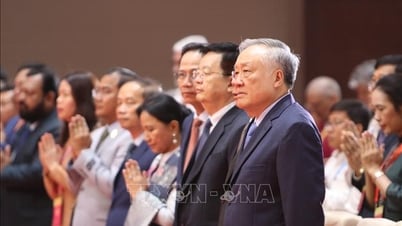
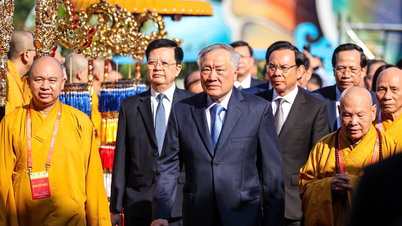




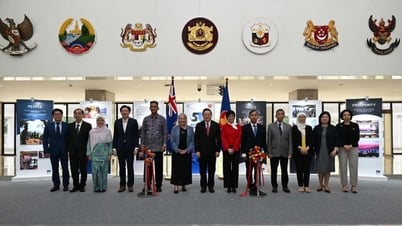
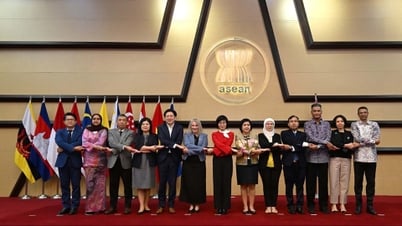
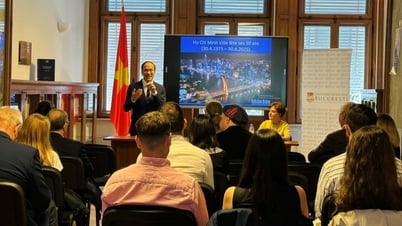
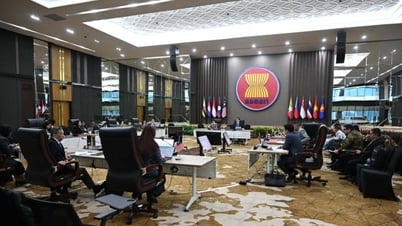

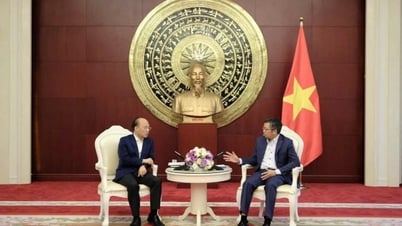































![[Photo] Prime Minister Pham Minh Chinh talks on the phone with Singaporean Prime Minister Lawrence Wong](https://vphoto.vietnam.vn/thumb/402x226/vietnam/resource/IMAGE/2025/5/8/e2eab082d9bc4fc4a360b28fa0ab94de)













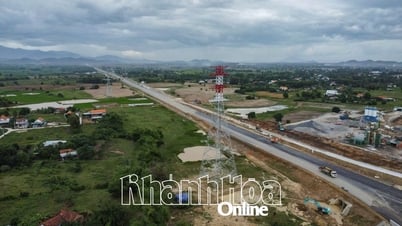
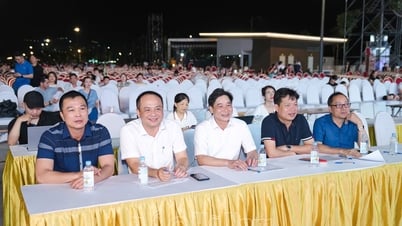

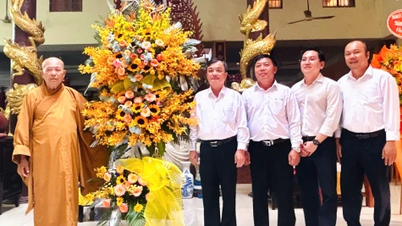















Comment (0)